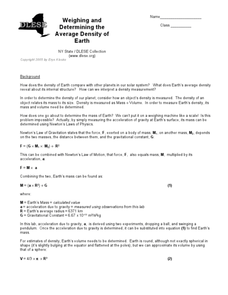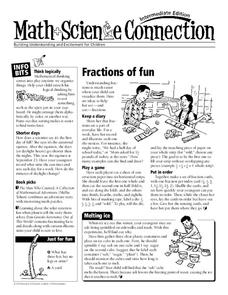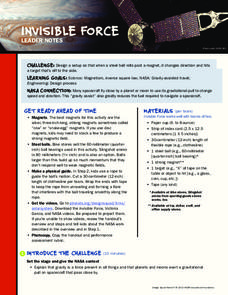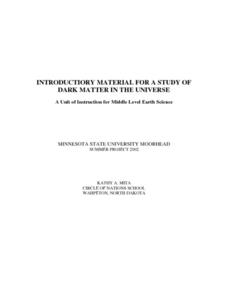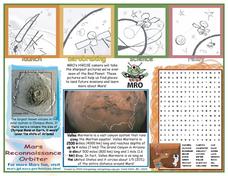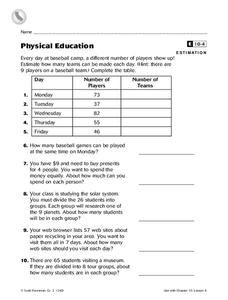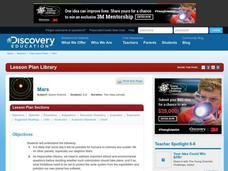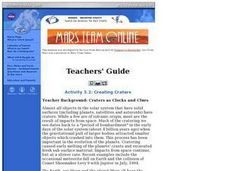Curated OER
Weighing and Determining the Average Density of the Earth
Some background information about density and Newton's Laws of gravitation and motion assist pupils in the following experiment. The procedure will help them further their understanding of gravity, pendulums, and a drop-ball experiment....
NASA
Taking Apart the Light
Break down light into spectra. Scholars learn how atoms emit and absorb photons and come to understand how this process allows scientists to identify different atoms based on either absorption lines or emission lines. Learners then...
Wilderness Classroom
Ocean Life
Our oceans are composed of many complex relationships. Young oceanographers explore relationships between organisms, understand the world ocean's currents, and discover the effects of water pollution and how it behaves. There are...
Resources for Educators
Fractions of Fun
Reinforce concepts and encourage learner engagement with a collection of math games, science experiments, and cross curricular activities. In one fun resource, learners sort objects, keep a diary of everyday fractions, play a game using...
PBS
Invisible Force
Investigate invisible forces. Young engineers design a setup that changes the direction of a steel ball using a magnetic force. The purpose of the setup is to model the gravitational pull of spacecraft by planetary bodies.
PBS
Robo Arm
Future engineers create robotic arms like those on rovers built by NASA in the second instructional activity of the series. They test their devices by attempting to pick up and move cups to a specified location.
Curated OER
Fact or Fantasy?
Are we alone in the universe? This brief informational text on extraterrestrial theory has been split into seven sections to help scholars practice note taking. They read the statements, underlining key words. Then, using the graphic...
Chapman University
The Standard Model Poster
Chemistry classes will appreciate this color-coded, single-page reference sheet for The Standard Model of particle physics. It is divided into two main sections: elementary particles and compound particles, both with their antiparticles....
Curated OER
Dark Matter In The Universe
Students investigate the concept of dark matter and how it occurs in the universe. They conduct research using a variety of resources. Students use the information by reading at least two articles about dark matter. They also generate...
Curated OER
Spuds in Space
Students explore the effects of velocity on an object when it collides with another object. They design and outfit a potato astronaut in a spacesuit to withstand the hazards of high velocity impacts from space debris and meteoroids.
University of Colorado
Phases of Charon
Charon, the largest of Pluto's moons, was discovered in 1978. Lesson is a walk through of how to solve for the phases of Charon. It uses two different points on Pluto and takes into account the tilt of the pole, the rotational axis, and...
Curated OER
Location
Students explore the tools used by Columbus to chart his latitude. They study the change of a location over time.
Curated OER
TAKING APART OWL PELLETS
Students dissect and owl pellet and then reconstruct small rodents on a presentation board using a textbook picture as a guide.
Curated OER
Mars Reconnaissance Orbiter Fact Sheet
In this space worksheet, learners will read facts about Mars and the Mars Reconnaissance Orbiter. Students will also find 24 space related words in a word search.
Curated OER
Lesson 4 Activity 1: Mapping the Third Dimension
Learners work in pairs to construct a simple stereoscope.
Curated OER
Estimation
Ten word problems provide practice in estimating. This worksheet is intended to accompany a specific text and lesson; however, it is useful without those resources.
Curated OER
Whose Water Is It?
Students role-play as San Francisco residents in 1908 who support or oppose the building of a dam in Yosemite National Park. They create posters and write letters to representatives defending their positions.
Curated OER
The Vocabulary of Space
Students build their knowledge and understanding of vocabulary related to space. In this space lesson, students discuss four categories of words and phrases related to space.
Curated OER
Mars
Students debate the ethical considerations involved in colonizing and terra-forming Mars. They have a preliminary discussion and view a video clip about Mars, then break into support and oppose groups to research and prepare their...
Curated OER
Gravity Gets You Down
Students investigate the force of gravity and how it effects different objects that are put into acceleration when applied the experiment of free falling. They drop different objects that have a variety of masses and some that cause air...
Curated OER
Using Bloom's Taxonomy in Science
Help your students internalize knowledge by creating activities that utilize higher level thinking skills.
NASA
The Drake Equation
In this Drake Equation worksheet, students read about how scientists can estimate the number of intelligent civilizations that may exist in our galaxy. Students answer 7 questions about the Drake Equation and they use the internet to...
Curated OER
Creating Craters
Learners explore parts of an impact crater and compare and contrast craters found in Earth, the Moon, and Mars. Crater formation is modelled and the relationship of mass, velocity, and size of the projectile to the crater formation is...
Curated OER
Biospheres
Second graders create models, practice inquiry skills, work with fellow students in teams, and reinforce concepts discussed in class all by using the theme of BIOSPHERES.
Other popular searches
- Solar System Inner Planets
- Solar System Planets
- Solar System and Planets
- Science Planets Solar System
